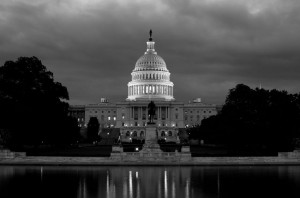On the Hill: AHA Will Hold Congressional Briefings to Fight Repeal of Johnson Amendment
 Photo by orhancam / 123RF
Photo by orhancam / 123RF Well, that didn’t take long. HR 172, which would repeal the Johnson Amendment, has been reintroduced in the US House of Representatives by Rep. Walter Jones (R-NC). Incidentally, Jones has introduced the bill in almost every session of Congress since he was first elected in 1995.
The Johnson Amendment is a 1954 law that prevents religious and other tax-exempt organizations from endorsing candidates for public office and from lobbying or engaging in other political activities. During his presidential campaign, Donald Trump promised to repeal the Johnson Amendment, a move that garnered him support from many religious right leaders.
As Noah Bookbinder of Citizens for Responsibility and Ethics in Washington recently noted,
Current tax and campaign finance law allows two kinds of outside groups to engage in political activity. So-called super PACs are political organizations that can spend as much money as they want on campaign activity, as long as they don’t coordinate their messages with candidates. Super PACs, however, must disclose their donors. Several types of tax-exempt section 501(c) organizations—including “social welfare” groups, trade associations, chambers of commerce, and labor unions—also can engage in some political activity. These groups are not allowed to spend more than half of their budgets on politics, but they can keep their donors secret. While both super PACs and section 501(c) organizations are largely exempt from paying taxes on their income or spending, donors may not deduct contributions to them from their taxes. Contributions to charities, on the other hand, are tax-deductible. Charities also do not need to disclose their donors.
Essentially, churches would be able to donate money to political candidates, while the original donors of those funds would maintain complete anonymity, and would receive tax deductions for their donations – two things they couldn’t do if they gave to traditional political advocacy organizations. This unfair advantage in political donations, combined with the spiritual and personal authority of houses of worship, would make religious institutions even more powerful in US elections.
But the American Humanist Association and humanists across the country aren’t going to sit this fight out and let Rep. Jones and the religious right take control of our elections. To educate legislators about the importance of the Johnson Amendment, the AHA is organizing briefings in both the US House and Senate, scheduled for January 31, 2017, that will feature experts on the topics of religious freedom and campaign finance from the Baptist Joint Committee for Religious Liberty, Citizens for Responsibility and Ethics in Washington, and the Freethought Equality Fund.
This bill could be one of the most important and detrimental pieces of legislation introduced during this session of Congress, and unfortunately it now has a chance of becoming law considering the Republican control of Congress and the executive branch. That’s why it is so important that humanists take the time to advocate on this issue, either by writing to their representative and senators, attending town hall meetings, or organizing protests against this bill. Our voice may be diminished in the new Congress, but it has not been extinguished. We can, and must, speak out on legislation like the Jones repeal bill to stop those who would see our democracy subordinated to our religious institutions.
